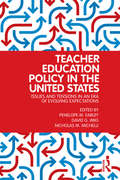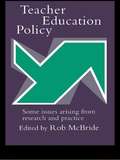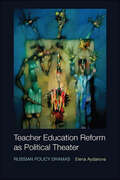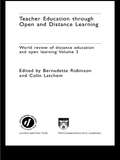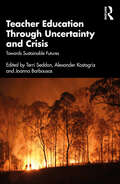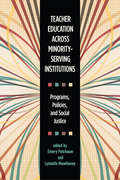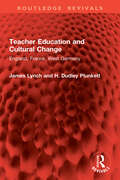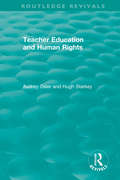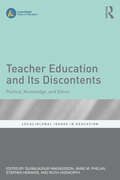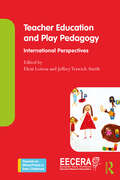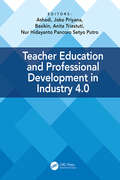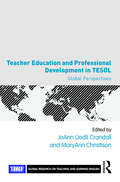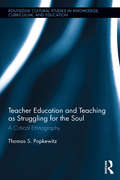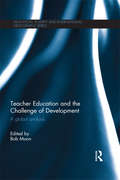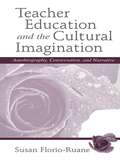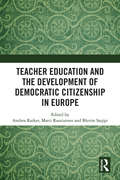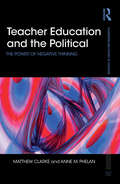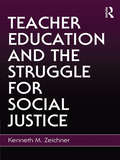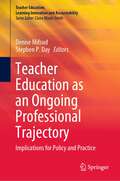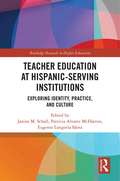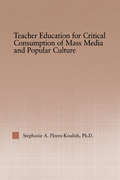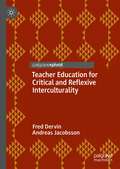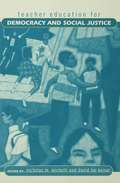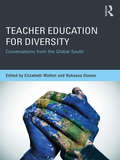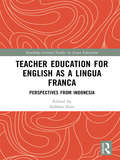- Table View
- List View
Teacher Education Policy in the United States: Issues and Tensions in an Era of Evolving Expectations
by Nicholas M. Michelli Penelope M. Earley David G. ImigWhat constitutes a high quality teacher education program and what standards teacher candidates should meet before receiving their teaching credential? This volume advances deep understanding of the nature and sources of policy affecting the preparation of teachers in the U.S. and the conflicts or interconnections of these policies with the broader field of education policy. Contributions from actors in the policy world and experts representing the stakeholders are balanced and based on issues currently facing the field. Policy is viewed as evolving and political. The connection or lack thereof between policy and research is examined. Policy case studies ground the principles developed within specific chapters in practice and illustrate that policy questions and solutions are continually evolving and unsettled. Chapter-end commentaries by the editors relate the focus of each chapter to the overarching themes of the book: policy formation, policy influences, policy paradoxes, and connections to research. This volume is an essential resource for understanding and resolving today’s uncertainty and confusion over teacher education policy.
Teacher Education Policy: Some Issues Arising From Research And Practice
by Rob McBrideTo improve schools we need to improve teachers. This volume provides recent research evidence that suggests that current education policy is not Promoting Effective Teacher Education And That Teacher Education Policy has: failed to support the formation of professional partnerships in initial teacher education; has almost ignored the induction of newly qualified teachers; and has narrowed in-service education into support for the implementation of central policy.; The evidence gathered in this book is used to argue for new forms of teacher education in every phase, built upon the foundation of professional partnership between schools and institutions of higher education. It is suggested that the funding for such changes could be drawn from less effective forms of school improvement, such as National Curriculum development and school inspection. With the implementation of such changes, it is argued, good quality teacher education programmes would prosper and foster a broad concensus about educational development that is often absent.
Teacher Education Reform as Political Theater: Russian Policy Dramas
by Elena AydarovaWinner of the 2021 Outstanding Book Award presented by the Society of Professors of EducationWinner of the 2020 Critics Choice Award presented by the American Educational Studies Association (AESA)Winner of the 2020 Outstanding Book Award presented by the Council on Anthropology and EducationAround the world, countries undertake teacher education reforms in response to international norms and assessments. Russia has been no exception. Elena Aydarova develops a unique theatrical framework to tell the story of a small group of reformers who enacted a major reform to modernize teacher education in Russia. Based on scripts circulated in global policy networks and ideologies of national development, this reform was implemented despite great opposition—but how? Drawing on extensive ethnographic material, Aydarova teases out the contradictions in this process. Teacher Education Reform as Political Theater reveals how the official story of improving education obscured dramatic and, ultimately, socially conservative changes in the purposes of schooling, the nature and perception of teachers' work, and the design of teacher education. Despite the official rhetoric, Aydarova argues, modernization reforms such as we see in the Russian context normalize social inequality and put educational systems at the service of global corporations. As similar dramas unfold around the world, this book considers how members of scholarly communities and the broader public can respond to reformers' stories of crises and urgent calls for reform on other national stages.
Teacher Education Through Open and Distance Learning: World review of distance education and open learning Volume 3 (World Review Of Distance Education And Open Learning Ser. #Vol. 4)
by Colin Latchem Bernadette RobinsonHow can open and distance learning and information and communications technology (ICT) provide us with more - and better - teachers?Open and distance learning is increasingly used in teacher education in developing and developed countries. It has the potential to strengthen and expand the teaching profession of the twenty-first century and to help achieve the target of education for all by 2015. Teacher Education Through Open and Distance Learning examines the case for using open and distance learning and ICT to train our educators. It describes and analyses the ways in which these methods and technologies are used for:*initial teacher training and continuing professional development*training principals and school managers*training those who provide non-formal adult and community education*communities of practice and sharing of knowledge and ideas within the teaching professionIt also discusses the policy-making, management, technology, costing, evaluation and quality assurance aspects of this work. The contributors are outstanding practitioners in the field. The first review in over a decade, Teacher Education Through Open and Distance Learning draws on wide-ranging and international experience to summarise the strengths and weaknesses of new approaches to the education of teachers. It offers invaluable guidance to policymakers, planners, headteachers and teachers.
Teacher Education Through Uncertainty and Crisis: Towards Sustainable Futures
by Terri Seddon Alexander Kostogriz Joanna BarbousasThis book examines teacher education at a critical turning point in the neoliberal dispensation that has steered education policy and practice since the 1980s. It examines Australia’s teacher education reforms, the ‘TEMAG reforms’ launched in 2014, and traces their effects on teacher education practice in 2019 and into the challenges, uncertainties and doubts of 2020’s entangled health, economic and environmental crises. Combining data-rich insights into policy and professional workspaces and places, with a temporal sensibility, this book probes the limits of neoliberal logics and shows how school- and university-based educators’ professionalism sustains the preparation of beginning teachers through school-university partnerships. Teacher Education Through Uncertainty and Crisis explores the relationalities, spatialities and temporalities of teacher education, sketching hopeful innovations, pathways and sustainable futures for teacher professionalism. This book will be of interest to policymakers, teacher educators and other professionals who understand the power of education in an uncertain world.
Teacher Education across Minority-Serving Institutions: Programs, Policies, and Social Justice
by Annette M. Daoud Brian Harper Byung-In Seo Carmelita Lamb Cheryl A. Franklin Torrez Danielle Lansing Dewitt Scott Denise L. Mclurkin Emery Petchauer Irene Welch Jonathan Brinkerhoff Joni S. Kolman Laura M. Gellert Lynnette Mawhinney Mae S. Chaplin Mary Bay Norma A. Lopez-Reyna Rosanne Ward Sandra BrowningThe first of its kind, Teacher Education across Minority-Serving Institutions brings together innovative work from the family of institutions known as minority-serving institutions: Historically Black Colleges and Universities, Tribal Colleges and Universities, Hispanic Serving Institutions, and Asian American and Native American Pacific Islander Serving Institutions. The book moves beyond a singular focus on teacher racial diversity that has characterized scholarship and policy work in this area. Instead, it pushes for scholars to consider that racial diversity in teacher education is not simply an end in itself but is, a means to accomplish other goals, such as developing justice-oriented and asset-based pedagogies.
Teacher Education and Cultural Change: England, France, West Germany (Routledge Revivals)
by James Lynch H. Dudley PlunkettFirst published in 1973, Teacher Education and Cultural Change analyses significant issues in the reform of teacher education on the evidence of up-to-date official and academic source materials and direct investigation. It contributes to the comparative sociology of education by highlighting the question as to whether teacher education policies are geared primarily to educational and social conservation or change. Features of teacher education are classified according to a scheme comprising four linked themes—cultural perceptions of teaching; the process of becoming a teacher; curricula; the organization of teacher education. Attention is given to cultural and social factors acting to democratize educational philosophies and structures. Reform-oriented policies are evaluated for their coherence and sociological realism. Differences in the three systems are found to reflect their histories and their socio-economic and political contexts, but a common movement is discerned towards democratic systems, responding to person rather than to institution-centred values.The book should help to fill a serious gap in comparative studies of teacher education, and should be of interest to students, academics, and administrators concerned with the study and development of educational systems.
Teacher Education and Human Rights (Routledge Revivals)
by Audrey Osler Hugh StarkeyTeaching has been described as a hazardous profession and teacher educators are faced with a challenging task in preparing teachers for the future. Human rights are high on the international agenda but also have direct implications for teachers and students in the classroom. Originally published in 1996, this book brings together teacher education and human rights to examine how we might best educate children and young people for citizenship. Drawing on case studies from the UK, Europe and internationally, the authors provide practical suggestions for ways in which teachers can increase young people’s awareness of the importance of securing their rights and those of others in the community. Looking particularly at how teachers might challenge injustice, racism and xenophobia, they examine human rights as a basis for educational policies and discuss how international human rights instruments can be incorporated into the teacher education curriculum. The book will benefit teacher trainers, teachers and education policy makers concerned with race, gender and special needs: undergraduate and postgraduate student teachers and educational researchers.
Teacher Education and Its Discontents: Politics, Knowledge, and Ethics (Local/Global Issues in Education)
by Anne M. Phelan Gunnlaugur Magnússon Stephen Heimans Ruth UnsworthThis unique collection of essays from researchers and teacher educators from around the world presents innovative approaches to education theory, critical policy analyses, de-colonializing reformulations of teacher education and a “standard of dissensus” for teacher education.This first volume from the International Teacher Education Research Collective (ITERC) illustrates common themes and problems in the politics of education, in particular, standardization, marketization, governance and policy in education, with both country-specific cases and generally formulated theoretical discussions. The book has three primary aims: to illustrate and critique the ethical, epistemological and political discourses shaping teacher education; to identify and unravel the entanglements of politics, knowledge and ethics in teacher education in a range of international settings; and to revitalize teacher education by proposing and exploring alternative modes of thought and practice. The volume contributes to further reflection and in-depth discussion in education, to the formulation of new areas for educational research and to critical resistance to hegemonic discourses of education.Making an important contribution to contemporary education discourse, this book is a useful guide for education researchers and theorists, teacher educators and postgraduate and higher degree research students in education.
Teacher Education and Play Pedagogy: International Perspectives (Towards an Ethical Praxis in Early Childhood)
by Jeffrey Trawick-Smith Eleni LoizouPlay has always been vital to the field of early childhood education, for teacher educators and early years teachers, as a pedagogy and way of organizing learning. With diverse perspectives from scholars around the world, Teacher Education and Play Pedagogy is a unique text focusing on teacher education for play pedagogy and uniquely blends research and praxis on authentically implementing play practices. This book is divided into two main sections: part 1 unfolds the different ways in which teacher educators have been preparing early years teachers to support children’s play and consider professional preparation for a play pedagogy; part 2 provides information on how teachers take on different roles, act in diverse ways to effectively support children to develop play skills, to learn and develop. With contributions from across the early childhood spectrum, researchers present their empirical work through multiple forms of data with deep reflections and critical stances towards the play pedagogy implementation. Teacher Education and Play Pedagogy is a valuable text for early childhood education undergraduate and graduate courses, for early childhood education researchers, as well as an essential reference for professional development programs and seminars.
Teacher Education and Professional Development In Industry 4.0: Proceedings of the 4th International Conference on Teacher Education and Professional Development (InCoTEPD 2019), 13-14 November, 2019, Yogyakarta, Indonesia
by Ashadi, Joko PriyanaBasikin, Anita Triastuti, Nur Hidayanto Pancoro Setyo PutroThe main theme of the proceedings of the 4th International Conference on Teacher Education and Professional Development (InCoTEPD 2019) is ‘’Teacher Education and Professional Development in Industry 4.0". The papers have been carefully grouped under the subthemes of teacher education and professional development, curriculum, learning materials, teaching-learning process, technology and media, and assessment in Industry 4.0 education. They also cover vocational education in the era in question and one section is devoted to Industrially disadvantaged societies. As these papers were presented at an internationally refereed conference dedicated to the advancement of theories and practices in education, they provide an opportunity for academics and professionals from various educational fields with cross-disciplinary interests to bridge the knowledge gap and promote research esteem and the evolution of pedagogy.
Teacher Education and Professional Development in TESOL: Global Perspectives (Global Research on Teaching and Learning English)
by JoAnn Jodi Crandall And MaryAnn ChristisonAt the forefront of research on English language teacher education and professional development, this volume presents new empirical research situated in different contexts around the world, including Canada, Denmark, Israel, Japan, Korea, Qatar, Sudan, and the U.S. It is framed by the volume editors’ insightful overview and analyses of previous and ongoing work in a variety of related domains and an epilogue by David Nunan. The chapter studies are organized around three themes: teacher identity in ESL/EFL teacher education and professional development programs, second language teacher education programs for diverse contexts, and professional development for diverse contexts. All chapters focus on the applied nature of the research and include a section on implications. To provide balance and a range of views, the volume includes both chapters reporting on empirical research funded by TIRF grant recipients and several from invited authors who are senior scholars in the field. This is the third volume in the Global Research on Teaching and Learning English Series, co-published by Routledge and TIRF.
Teacher Education and Teaching as Struggling for the Soul: A Critical Ethnography (Routledge Cultural Studies in Knowledge, Curriculum, and Education)
by Thomas S. PopkewitzChallenging conventional ways of thinking about school reforms and teacher education, this book analyses how the "knowledge systems" which organize how teachers’ observe, supervise, and evaluate children produces norms that have the effect of excluding children who are poor and of color. Building on Struggling for the Soul (1998), his original study of the day-to-day life of new teachers in the Teach for America program, Popkewitz delves deeper into how the teaching and learning practices of urban and rural schools. Applying an ethnographic focus to how difference and divisions are produced to exclude despite efforts to include, he explores the complexities of educational change and raises important questions about the politics of schooling, knowledge and power. This book provides an original way of thinking about ethnography through a critical post-foundational approach. Conceptually focusing the ethnography of "the system of reason" that organizes teacher practices, the analysis offers a critical lens to understand the contemporary politics of school reform, the limits of teacher research, and suggests why current teacher and teacher education reforms may conserve the very conditions required for change. Beyond its relevance to U.S. schools, the conceptual and methodological resources of the book have relevance internationally, especially given the global important of education responding to cultural and social diversity through teacher and teacher education reforms.
Teacher Education and the Challenge of Development: A Global Analysis (Education, Poverty and International Development)
by Bob MoonIn developing countries across the world, qualified teachers are a rarity, with thousands of untrained adults taking over the role and millions of children having no access to schooling at all. The supply of high-quality teachers is falling behind: poor status, low salaries and inadequate working conditions characterise perceptions of teachers in numerous countries, deterring many from entering the profession, and there are strong critiques of the one dimensional, didactic approach to pedagogic practice. Despite this, millions of teachers are dedicated to educating a newly enfranchised generation of learners. Teacher Education and the Challenge of Development is co-written by experts working across a wide range of developing country situations. It provides a unique overview of the crisis surrounding the provision of high-quality teachers in the developing world, and how these teachers are crucial to the alleviation of poverty. The book explores existing policy structures and identifies the global pressures on teaching, which are particularly acute in developing economies. In summarising the key policy and research issues and analysing innovative approaches to teacher supply, retention and education, this book: establishes an overview and conceptual analysis of the challenge to extend and improve the teaching force in developing contexts; sets out and analyses the quantitative and qualitative evidence around teacher contexts and conditions; provides a series of national studies that analyse the context of teachers and the policies being pursued to improve the number and quality of teachers; looks at a range of significant issues that could contribute to the reformulation and reform of teacher policies; provides an overarching analysis of the nature and challenges of teaching and the possible interventions or solutions, in a form accessible to policy and research communities. This book will be of interest to educationalists and researchers in education, teachers, policy makers and students of development courses at both undergraduate and postgraduate levels.
Teacher Education and the Cultural Imagination: Autobiography, Conversation, and Narrative
by Susan Florio-Ruane Julie deTarMaking culture a more central concept in the texts and contexts of teacher education is the focus of this book. It is a rich account of the author's investigation of teacher book club discussions of ethnic literature, specifically ethnic autobiography--as a genre from which teachers might learn about culture, literacy, and education in their own and others' lives, and as a form of conversation and literature-based work that might be sustainable and foster teachers' comprehension and critical thinking. Dr. Florio-Ruane's role in the book clubs merged participation and inquiry. For this reason, she blends personal narrative with analysis and description of ways she and the book club participants explored culture in the stories they told one another and in their responses to published autobiographies. She posits that autobiography and conversation may be useful for teachers not only in constructing their own learning about culture, but also, by doing so, in participating in the transformation of learning within the teaching profession.
Teacher Education and the Development of Democratic Citizenship in Europe
by Matti Rautiainen Andrea Raiker Blerim SaqipiThis book uses international collaboration between nine European countries to explore how teacher education systems across Europe perceive and act upon devolving democracy and democratic citizenship. Understanding these countries’ cultural approaches to individual and national priorities in education is essential in perceiving similarities and differences in the meaning of ‘democracy’. The book offers debate on the prospects for teacher education and the development of democratic citizenship in Europe based on historical, political, economic and cultural contexts and the Council of Europe’s (CoE) competences for democratic citizenship. With critical analysis and evaluation around the common theme of teacher education and its role in developing democratic citizenship, the book provides awareness and understanding of how teacher education responds to the Council of Europe’s (CoE) conceptual model of competences for democratic culture. 20 competences categorized as Values, Attitudes, Skills, and Knowledge and Critical Understanding are defined so they can be taught to enable learners to practice them in their daily lives as democratic citizens. This book will be of key interest to academics, researchers and post-graduate students in the fields of teacher education, educational policy and politics, and citizenship education.
Teacher Education and the Political: The power of negative thinking (Foundations and Futures of Education)
by Matthew Clarke Anne PhelanTeacher Education and the Political is a striking book which addresses the nature and purpose of teacher education in a global context characterised by economic and political anxieties around declining productivity and social inclusion. These anxieties are manifested in recent policy developments such as the promotion of professional standards, the deregulation and marketisation of teacher education and the imposition of performance-related regimes that tie teachers’ pay to outcomes in high-stakes testing. The book assesses the implications of such policies for the work of teachers as well as for teacher educators and those undertaking initial teacher training. It is argued that these policy moves can be read as a depoliticising and de-intellectualising of teacher education. In this context, they illustrate how contemporary theory can provide a language for critiquing recent developments and imagining new trajectories for policy and practice in teacher education. Drawing on the work of theorists from Derrida and Mouffe to Agamben and Lacan, this book argues for the need to maintain a space for intellectual autonomy as a critical dimension of the ethico-political work of teachers. Together these ideas and analyses provide examples of the power of negative thinking, illustrating its capacity to unsettle comfortable truths and foreground the political nature of teacher education. Current teachers, teacher educators and school leaders will be particularly interested readers, alongside those concerned with policy in the wider educational landscape.
Teacher Education and the Struggle for Social Justice
by Kenneth ZeichnerIn this selection of his work from 1991-2008, Kenneth M. Zeichner examines the relationships between various aspects of teacher education, teacher development, and their contributions to the achievement of greater justice in schooling and in the broader society. A major theme that comes up in different ways across the chapters is Zeichner’s belief that the mission of teacher education programs is to prepare teachers in ways that enable them to successfully educate everyone’s children. A second theme is an argument for a view of democratic deliberation in schooling, teacher education, and educational research where members of various constituent groups have genuine input into the educational process. Teacher Education and the Struggle for Social Justice is directed to teacher educators and to policy makers who see teacher education as a critical element in maintaining a strong public education system in a democratic society.
Teacher Education as an Ongoing Professional Trajectory: Implications for Policy and Practice (Teacher Education, Learning Innovation and Accountability)
by Denise Mifsud Stephen P. DayThis edited book provides a critical re-reading of the concept of teacher education, in addition to a re-thinking of the sole focus on Initial Teacher Education (ITE), with implications for education policy, theory, and practice. This book presents new investigations that explore the concept of teacher education from ITE to retirement and how this is being enacted within the various distinct European and international education contexts. It demonstrates teaching and teacher education as a deeply contested field within European education and within the different national contexts of Europe. Contributions in this book expose teacher education as a continuum of teacher learning that is set off from the beginning of the teachers’ own schooling and continues throughout their entire teaching career. The chapters deal with various issues, namely teacher induction and mentoring; teacher agency; teachers as researchers; the role of the head teacher; schools as learning communities; and distinct ITE practices. It is intended for postgraduate students and researchers with an interest in teaching and teacher education, educational policies and politics, and educational philosophy, as well as practitioners.
Teacher Education at Hispanic-Serving Institutions: Exploring Identity, Practice, and Culture (Routledge Research in Higher Education)
by Janine M. Schall Patricia Alvarez McHatton Eugenio Longoria SáenzDocumenting the collaborative work of staff at the University of Texas Rio Grande Valley over the course of several years, this text explores the many ways in which teachers and faculty must engage with the institutional designation of Hispanic-Serving Institution (HSI). In doing so, the volume illustrates how colleges of education might provide Latinx students with the education, support, and environment they require to thrive. As the number of HSIs continues to grow, this text provides much needed insight into how colleges and universities can better enact their HSI status. Chapters document the practices and experiences of faculty as they look to increase family engagement, utilize social and cultural values to inform instruction, and acknowledge historically institutionalized legacies of oppression and marginalization. By highlighting the successes and challenges associated with serving Latinx students, the text draws out the ways in which teacher education and development might be structured at an HSI, in order that the institutional identity is reflected in curricula, pedagogy, scholarship, and community engagement. The text also explains important distinctions between HSIs and other minority serving institutions and illustrates the importance of HSIs to Latinx students. This text will be of great interest to graduate and postgraduate students, researchers, academics, libraries, professionals and policy makers in the field of higher education, multicultural education, educational leadership, teacher education and Race & Ethnicity Studies.
Teacher Education for Critical Consumption of Mass Media and Popular Culture (RoutledgeFalmer Studies in Higher Education)
by Stephanie A. Flores-KoulishThe study develops a baseline of knowledge to encourage the inclusion of media literacy education in teacher education.
Teacher Education for Critical and Reflexive Interculturality
by Fred Dervin Andreas JacobssonThis book deals with the importance of interculturality in teacher education and training. It is mostly through the concept of intercultural competence that interculturality has been constructed and problematized for educators. However, different approaches and paradigms are available and differ and/or share similarities in terms of ideology, method, practice, theoretical frameworks, and ethical considerations. There is no global agreement on the meanings of interculturality in teacher education and training, although some principles might be common across national borders. There is thus a need for educators to consider these aspects of interculturality in education to be able to become better teachers in a diverse world like ours.
Teacher Education for Democracy and Social Justice
by David Keiser LeeExamines just how the important goals of educating for democracy can be achieved from the perspective of those working in teacher education and in P-12 schools.
Teacher Education for Diversity: Conversations from the Global South
by Ruksana Osman Elizabeth WaltonForegrounding the diversity that characterises various educational settings, this book discusses how histories and geographies of oppression, exclusion and marginalisation have impacted on teacher education. Contributors draw on first-hand experiences of living and working in countries including Brazil, China, South Africa, New Zealand and Malawi. Positioned in a geographical and metaphorical ‘Global South’, the book draws critical attention to debates which have been otherwise marginalised in relation to those conducted in the ‘Global North’. Chapters address difference and diversity on both a conceptual and empirical level, acknowledging the significance of various global trends including increased migration and urbanisation; and broadening understandings of race, religion, gender, sexuality and dis/ability. Taken together, these chapters reveal the extent of the work which still remains to be done in the field of teacher education for diversity. The issues discussed are of global significance, making this text key reading for teachers, teacher educators, and those concerned with the advancement of social justice and reduction of inequality through education.
Teacher Education for English as a Lingua Franca: Perspectives from Indonesia (Routledge Critical Studies in Asian Education)
by Subhan ZeinThis edited collection responds to a gap in the literature by presenting a much-needed examination of both the theoretical and practical aspects of teacher education for English as a lingua franca in Indonesia. Through a series of extended research-based and conceptual chapters written by experts in teaching English to speakers of other languages (TESOL) in and about Indonesia, this book offers an insight into Indonesia’s unique cultural, social and institutional contexts. The content focuses on four interrelated themes: the transition of perspective from English as a foreign language (EFL) to English as a lingua franca (ELF); the knowledge base of ELF pedagogy; teacher agency and identity in ELF; and innovations in teacher education for ELF. This book is highly relevant to English teachers, teacher educators and scholars worldwide aspiring to broaden their horizon and professionalism in the teaching of ELF.
